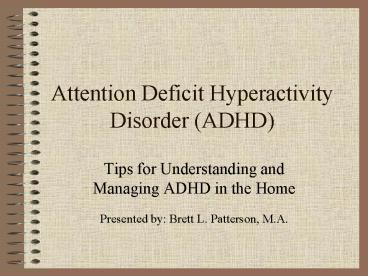Attention Deficit Hyperactivity Disorder ADHD - PowerPoint PPT Presentation
1 / 20
Title:
Attention Deficit Hyperactivity Disorder ADHD
Description:
Provide a basic understanding of what ADHD is, and what it is not. ... Forgetful. Easily distracted. Needs constant supervision ... – PowerPoint PPT presentation
Number of Views:87
Avg rating:3.0/5.0
Title: Attention Deficit Hyperactivity Disorder ADHD
1
Attention Deficit Hyperactivity Disorder (ADHD)
- Tips for Understanding and Managing ADHD in the
Home - Presented by Brett L. Patterson, M.A.
2
Goals for This Presentation
- Provide a basic understanding of what ADHD is,
and what it is not. - Attempt to answer any questions and dispel any
myths that many people have regarding ADHD. - Introduce some guiding principles for dealing
with ADHD behaviors.
3
ADHD Exposed
- ADHD is identifiable via behavioral, not physical
characteristics, making it more likely to be
misunderstood. - Misperceptions
- Behaviors that directly result from ADHD are not
primarily attributable to poor parenting, lack of
discipline, low motivation, or intentional
trouble making. - Not everything that fidgets and/or behaves
defiantly is ADHD.
4
What Is ADHD?
- Neurobehavioral disorder marked by
- Inattention
- Difficulties controlling impulses
- Excessive motor activity (hyperactivity)
- Be awarethe mere presence of these behaviors
does not mean the child has ADHD.
5
Indicators of ADHD as a Developmental Disorder
(Barkley, 1995)
- Seen in early child development
- Behaviors clearly distinguish child from non-ADHD
children - Occurs across several situations (though not
necessarily in all of them) - Behaviors persistent over time
- Child not able to perform at age-appropriate
levels - Not accounted for by environment of social causes
- Related to brain function
- Associated with other biological factors that can
affect brain function (i.e. head injuries,
genetics)
6
Things We Can See (aka, Common Complaints)
- Difficulties sustaining attention
- Daydreaming
- Child doesnt listen
- Always losing things
- Forgetful
- Easily distracted
- Needs constant supervision
- Child doesnt finish anything he/she starts
7
Common Complaints (contd)
- Problems with impulse control
- Impatient/Difficulties waiting for things
- Always interrupting others
- Blurts out answers
- Doesnt take turns
- Tries to take shortcuts on many tasks (including
chores, homework, etc.)
8
Common Complaints (contd)
- Hyperactivity
- Always on the go
- Squirmycant sit still
- Talks too much
- Frequently hums or makes odd noises
- Unable to put the brakes on motor activity
- Child has two speeds asleep and awake
9
What Do These Behaviors Have in Common?
- Problem isnt as much sustaining attention as it
is sustaining inhibitionthis is the hallmark of
ADHD - Inhibition a mental process that restrains an
action (behavior) or emotion - Problems of inhibition are not a matter of
choice, but are instead a result of what is (or
is not) going on in the childs brain
10
ADHD and the Human Brain
- Portions of brains frontal lobe are responsible
for Executive functions - Consolidating information from other areas of the
brain - Considers potential consequences and
implications of behaviors - Puts brakes on (inhibits) impulsive reactions
- Initiates appropriate response to environment
11
ADHD and the Brain (contd)
- Research suggests that in in children with ADHD,
these executive areas of the brain are
under-active - Increasing the activity level in these areas of
the ADHD brain have been shown to decrease
behavioral symptoms. This is the logic behind
using Stimulant medications as a first line
treatment for the disorder.
12
Common Stimulant Medications
- Methylphenidate (Ritalin)
- Dextroamphetamine (Dexedrine)
- Amphetamine/ Dextroamphetamine (Adderall)
- Pemoline (Cylert)
13
Things That Look Like ADHD
- Depression
- Anxiety
- Hearing problems
- Visual problems
- Seizure disorder
- Oppositional defiant disorder
- Autism
- Learning disabilities
- Parenting problems
- Substance use
- Medication side-effects
- Lead poisoning
14
Ten Guiding Principles for Raising a Child with
ADHD (Barkley, 1995)
- Give your child more immediate feedback and
consequences - Give more frequent feedback
- Use larger and more powerful consequences
- Use incentives before punishment
- Strive for consistency
15
Ten Guiding Principles for Raising a Child with
ADHD (contd)
- Act, dont yak!
- Plan ahead for problem situations
- Keep a disability perspective
- Dont personalize your childs problems or the
disorder - Practice forgiveness
16
In Using These Principles, It Is Important That
the Parent
- Pause before reacting to the child
- Use the ensuing delay to remember all 10 guiding
principles (post them around the house if
necessary) - Choose a response that is consistent with the
principles
17
Additional Tips for Managing ADHD Behaviors
- Pay positive attention to your childcatch them
being good - Give effective commands
- Short, sweet, and straightforward
- Limit the number of tasks to 1-2 per command
- Maintain clear and consistent expectations
- Communicate realistic consequences for inability
to meet expectations
18
Tips for Managing ADHD (Contd)
- Manage the childs environment
- Limit distracting influences during times when
child is asked to be on task (i.e. homework) - Maintain a regular and predictable daily
schedule - When eliciting childs input, limit (but dont
eliminate) the number of choices available to
him/her to 2-3 options
19
Tips for Managing ADHD (Contd)
- Be patient
- Be persistent
- Be understanding
- Most importantly, remember to differentiate the
behaviors from the child - Bad behaviors are not synonymous with a bad child
20
Resources Available to Parents
- Children and Adults with ADD (CHADD) a family
support organization that provides a variety of
services. (www.chadd.org or the Central OK
chapter phone number is 405-722-1233 - There is a plethora of readings available to
those interested in obtaining more information on
ADHD. One that I have found particularly useful
in working with parents is Taking Charge of ADHD
The Complete Authoritative Guide for Parents, by
Russell A. Barkley, Ph.D. (1995)































